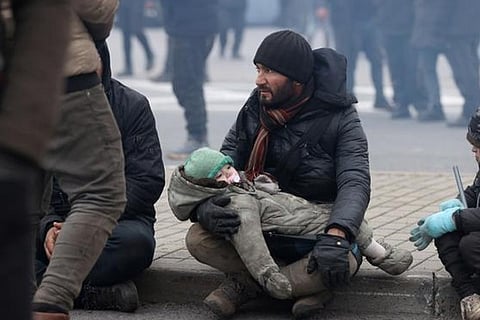

She describes in the Facebook post how “grateful” they were to receive the clothing. “The black coat fit a slender woman, I then pulled the mittens onto another person’s hands, she had stuck her cold hands out me, it made me cry.” The blogger says she spotted the group outside a shopping center in central Minsk and decided to help.
The woman’s message has garnered over 500 likes so far, and has been shared more than 50 times. But not everyone applauds her efforts.
Some users on the platform accuse her of assisting people who have supposedly paid the Belarus government to reach Germany. They question whether the individuals are “fleeing war and repression.” Others accuse most migrants of being financially better off than people in Belarus, who, they say, face enough hardship already.
The average monthly income in Belarus is equivalent to roughly $570. Belarus public opinion is divided over how the new arrivals should be treated.
While some regard the migrants as victims who fled abusive regimes in their home countries, others disagree. They say migrants in Belarus are wearing expensive clothes, own premium smartphones, and merely care about reaching “wealthy Germany.”
Many of those who show solidarity with migrants are accused of backing President Alexander Lukashenko’s authoritarian regime, which is suspected of having encouraged people from the Middle East to travel through Belarus to reach the European Union.
Belarusian Daria Sapranetskaya says she began noticing how migrants were increasingly in Minsk since late summer. “By autumn, there were more and more. Initially, you could have thought they were tourists and that Belarus had become popular with Middle Eastern travellers,” she says. “But now, we see them with sleeping bags.” The photographer says she hasn’t observed any negative reactions from her compatriots on the street — but she notes:
“If Belarusians are unhappy with something, they discuss it at home or on the internet.” Sapranetskaya, too, has donated warm clothes to the new arrivals. “It’s none of my business to know what drove them to come here. I consider them human beings just like us, regardless of their skin color,” she says.
She then describes some of the scenes she witnessed: “There was a little girl, too young to walk, in a carrying pouch slung around her mother’s stomach — with socks but no shoes on her feet.” Daria recounts seeing another young girl, presumably two years old, wearing nothing but a fluffy pajama made from synthetic fabric, and no hat.
“It would be life-threatening for a child to travel to the Belarus-Poland border dressed like this,” says Sapranetskaya. “When you see people in need and you can help, you help. I feel sorry for the people who are freezing on the streets.”Aleksey Leontshik set up ByHelp, a foundation that aids Belarusians who are being persecuted by the Lukashenko regime, as well as those who have decided to flee abroad.
For Leontshik, there is a difference between Belarus refugees, and migrants today hoping to emigrate to Europe by way of Belarus.
“These people are buying travel tickets from the deceitful Lukashenko [regime],” says Leontshik, adding that it helps finance the regime and puts further strain on neighboring countries like Poland and Lithuania, which are keen to promote democratic reforms in Belarus.
Visit news.dtnext.in to explore our interactive epaper!
Download the DT Next app for more exciting features!
Click here for iOS
Click here for Android